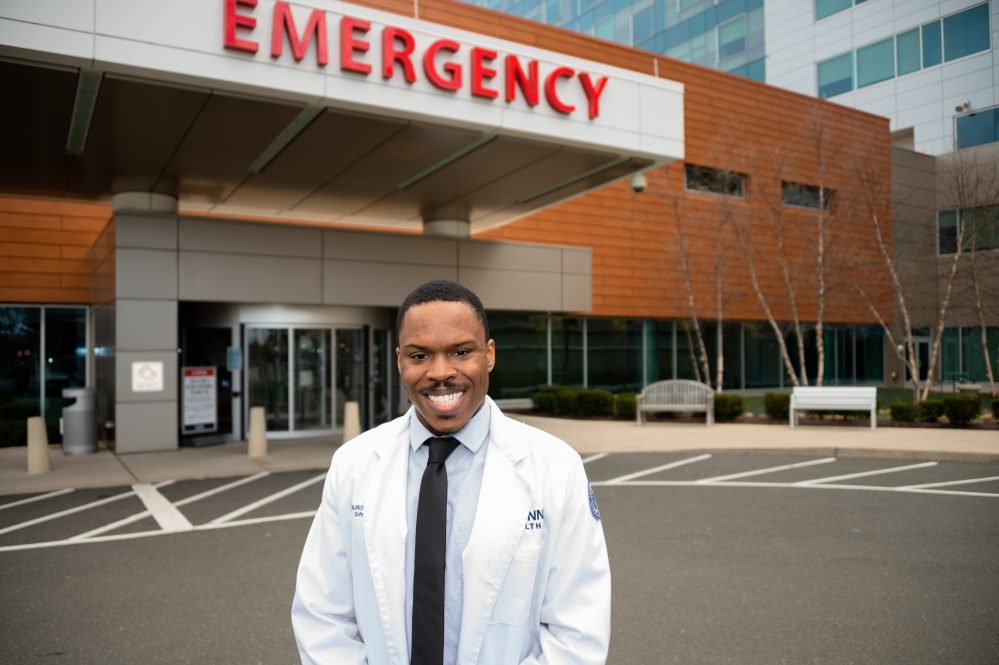Students often get generic advice urging them to “explore their world” or something similar, but for Nurudeen Osumah, that exploration was very literal.
Some of his fondest memories of his time at UConn School of Medicine involved roaming the hallways with fellow students, coming upon undiscovered nooks and crannies, and getting an appreciation for the workings of a busy hospital.
Now, Osumah will get to do even more exploring, as a new emergency medicine resident at UConn Health. As he looks forward to that, and looks back to four years of hard work and fond memories, Osumah says UConn has given him the tools he needs to succeed in life and in medicine.
Why did you choose UConn?
I chose UConn for multiple reasons. The school had a strong brand name with excellent national recognition. I am a Connecticut native so I wanted to remain close to my family. During my interview session, I was drawn to the abundance of volunteering opportunities UConn had available as first year medical students.
Why did you choose to enter medical school/the field of medicine?
I chose to enter medical school because I wanted to be a mentor to those that came after me who were also looking to enter medical school. I wanted to be an inspiration to others to follow their passion and provide a service to people who need it the most in their most vulnerable time.
What are your plans after graduation?
I am thankful to have matched at University of Connecticut for my residency in emergency medicine. After completing residency, I am deciding on completing a fellowship in administration hoping to advocate for positive change in the hospital system or going into academia to mentor and teach the next generation of medical students.
What activities were you involved with as a student?
Throughout my time at UConn, I volunteered much of my time for Health Career Opportunity Programs such as mentoring high school students in Saturday Academy, participating in the yearly Bridge to the Future Science Mentoring Conference, and working as an MCAT tutor. I also volunteered my time in Urban Service Track such as Migrant Farms and worked as TA for our UConn Patient Advocacy in Communities, Teams & Health Systems (PACTS) curriculum.
How has UConn prepared you for the next chapter in life?
UConn has provided me with the confidence, tools, and knowledge to be a compassionate, hard-working, and flexible physician in a high-stress environment.
What’s one thing that surprised you about UConn?
What surprised me about UConn was how easily accessible the faculty were whenever you had questions or just stop in and say “hi.” It felt refreshing to have that level of support during my medical school journey.
Any advice for incoming first-year medical students?
Do not worry about what others are doing. Have confidence in yourself and your abilities; that you were chosen for a purpose in life. As entering medical school was a momentous occasion in your life, enjoy yourself and take each day as it comes. Make sure to create fond memories because four years goes by really fast!
What’s one thing every student should do during their time at UConn?
Explore the entire hospital during the night with a few friends! It was very fun and some of my best memories. I got to see babies in the NICU, discovered a Hartford Medical Society Library/Museum, and found random shortcuts to get around in the deepest corners of the UConn hospital.
Who was your favorite mentor and why?
Dr. Adam Perrin. For me, he is an awesome professor who cares for his students. I had the pleasure working with him for one of UConn’s curriculum.
What’s one thing that will always make you think of UConn?
I will never forget all of the friends that I made here, the faculty I had the pleasure of meeting, and the memories that I made.
What was it like training to be a doctor during a pandemic?
It was difficult and frustrating being on rotations in the hospital only to be denied seeing patients because they were COVID positive. At that time, I felt useless because I wanted to be involved in the patient care and help alleviate the burden that other healthcare professionals were facing. Thankfully, things gradually eased up as precaution recommendations changed.



